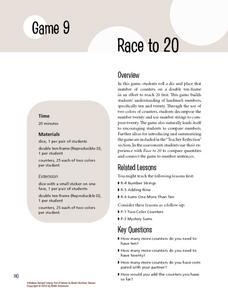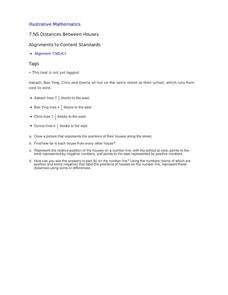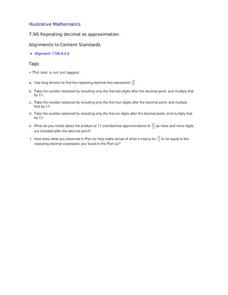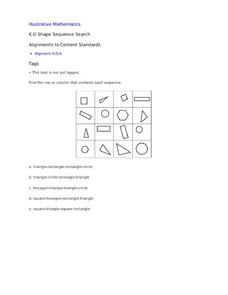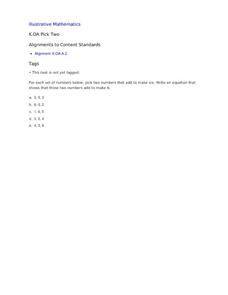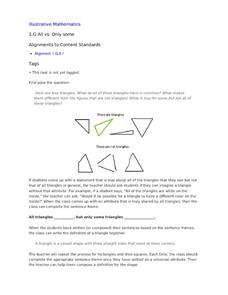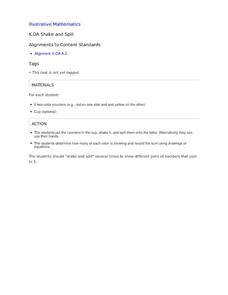Scholastic
Adding and Subtracting Ten
Developing fluency with basic addition and subtraction is fundamental to the success of all young mathematicians. This four-day lesson series begins with learners using ten-frames and hundreds charts to recognize patterns when adding and...
Math Solutions
Race to 20
And they're off! Working in pairs, young mathematicians roll dice to see who can fill in their double ten-frames first. When learners finally fill in their arrays, they create addition number sentences that represent their rolls, helping...
Illustrative Mathematics
The Napping House
How many people and animals can cram into a single bed? Find out with this cross-curricular math and language arts lesson. Following along with a reading of the children's book The Napping House by Audrey Wood, young mathematicians add...
Curated OER
Distances Between Houses
This resource sneaks in the math so your learners will be adding and subtracting positive and negatives on a number line while thinking they are mapping out houses. The activity starts by putting houses the appropriate distance away from...
Curated OER
Valentine Marbles
if you've ever had to guess how many items were in a jar, then this problem is for you! With a big jar full of red and white marbles, does picking a sample of 16 allow your learners to get a good estimate on the percentages of each...
Curated OER
Measuring the Area of a Circle
When mathematical errors happen, part of the learning is to figure out how it affects the rest of your calculations. The activity has your mathematicians solving for the area of a circular pipe and taking into consideration any errors...
Curated OER
Repeating Decimal as Approximation
You are used to teaching repeating decimals with bar notation that keeps us from writing that number over and over again; now teach what the over and over again represents. This activity allows your mathematicians to explore the infinite...
Curated OER
Rolling Twice
Rolling dice is the best way to show your learners how probability comes in to play. Although this lesson does not specify an activity, your mathematicians can try this probability with real dice to calculate their experimental...
Illustrative Mathematics
Which Number is Greater? Which Number is Less? How do you Know?
When comparing groups of objects, it's easy for children to identify which has more, but it's not so easy for them to explain their reasoning. This simple whole-group activity provides multiple opportunities for learners to compare...
Education Closet
Equal Rhythms
Engage young mathematicians in learning about fractions with this cross-curricular math and music lesson. After listening to and repeating different beat patterns, children realize that musical notes are just another way of representing...
Illustrative Mathematics
Measure Me!
How many unifix cubes tall are you? If you're not sure, then perform this math activity with your class and find out. Working in pairs, young mathematicians make measuring sticks out of unifix cubes in order to determine the length of...
Illustrative Mathematics
Grandfather Tang's Story
It's amazing the complex figures that can be made using only a few simple shapes. Following a class reading of the children's book Grandfather Tang's Story by Ann Tompert, young mathematicians use sets of tangrams to create models of the...
Illustrative Mathematics
Counting Squares
Challenge young mathematicians' understanding of squares with this geometry puzzle. The task is simple, identify as many squares as possible in a 3x3 array. Allow learners to work independently or in pairs as they search for squares,...
Curated OER
US Airports, Assessment Variation
Determining relationships is all part of algebra and functions. Your mathematicians will decide the type of relationship between airports and population and translate what the slope and y-intercept represent. The problem is multiple...
Illustrative Mathematics
Shape Sequence Search
Learning that size and orientation don't affect the classification of shapes is a big step for young mathematicians. Support children with developing this key understanding by looking at the array of shapes included in this resource. For...
Illustrative Mathematics
Shape Hunt Part 2
Shapes are everywhere in the world around us, from rectangular doors to the circular wheels of a car. The second lesson plan in this series opens the eyes of young mathematicians to this wonderful world of shapes as they search the...
Illustrative Mathematics
3-D Shape Sort
From the apple on your desk and the coffee cup in your hand, to the cabinets along the classroom wall, basic three-dimensional shapes are found everywhere in the world around us. Introduce young mathematicians to the these common figures...
Illustrative Mathematics
Alike or Different Game
How are a circle and triangle alike? How are they different? These are the types of questions children will answer while playing this fun geometry game. Including a variety of conventional and unconventional shapes, this activity allows...
Illustrative Mathematics
What’s Missing?
Now you see them, now you don't! This fun peek-a-boo activity engages young mathematicians in developing their ability to compose and decompose numbers. After being presented with a series of counters, children close their eyes while the...
Illustrative Mathematics
Pick Two
Learning to break apart numbers into smaller pairs is a critical step young mathematicians take as they develop their number sense. To practice this skill, children are provided with sets of three numbers and are asked to pick the two...
Illustrative Mathematics
Which Weighs More? Which Weighs Less?
Expand the the comparative language of young mathematicians with a hand-on weight measurement activity. Working independently or in pairs, children compare the weight of large wooden blocks to various other classroom objects, recording...
Illustrative Mathematics
All vs. Only Some
All shapes have certain defining attributes that set them apart from others. In order to understand this, young mathematicians look at examples and non-examples of triangles, rectangles, and squares, working as a whole class to create...
Illustrative Mathematics
Shake and Spill
Entertaining as well as educational, this math activity about decomposing numbers is bound to capture the engagement of young learners. Given a cup and five two-color counters, young mathematicians simply shake and spill the cup,...
Illustrative Mathematics
Christina's Candies
Help Christina figure out how many chocolate and lemon candies she has with a lesson on decomposing numbers. When presenting this context to the class, the teacher chooses the total number of candies and the number that are chocolate,...
Other popular searches
- Famous Mathematicians
- Great Mathematicians
- 5 Great Mathematicians
- Female Mathematicians
- Projects on Mathematicians
- Five Great Mathematicians
- The Great Mathematicians
- Mathematicians Fibonacci
- List of Great Mathematicians
- Hall of Great Mathematicians
- Whorls Famous Mathematicians
- The Old Grete Mathematicians



